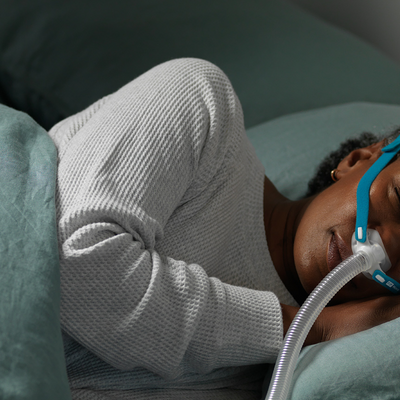Written by Nancy Kirk
September 20, 2024
Sleep apnea is often associated with other health comorbidities such as hypertension, diabetes, and high cholesterol levels. Cholesterol is a waxy substance in your blood essential for building healthy cells, but too much can lead to dangerous health conditions. The relationship of sleep apnea and cholesterol levels is complex, but understanding it is crucial for managing your overall health. Let’s explore how sleep apnea affects cholesterol and how to manage both conditions effectively.
What Is Sleep Apnea?
Sleep apnea is a common yet often undiagnosed condition that affects millions of people worldwide. Characterized by repeated interruptions in breathing during sleep, sleep apnea can lead to a variety of health issues, including daytime fatigue, high blood pressure, and an increased risk of heart disease. This, however, can be treated with CPAP therapy, which allows you to experience restful sleep, longer-lasting energy levels, sharper focus, and reduced risk of disease.
Sleep apnea affects about 25 million adults in the United States, according to the American Academy of Sleep Medicine.1 However, it’s estimated only 6 million have been diagnosed. This is partly because the symptoms can be subtle and are often mistaken for other conditions. Risk factors for sleep apnea include obesity, age, and a family history of the disorder.
The Role of Cholesterol in Your Body
Cholesterol is a type of lipid that is found in your blood. It’s essential for building cell membranes, producing certain hormones, and making vitamin D. Cholesterol is transported through the bloodstream in two main types of lipoproteins:
-
Low-Density Lipoprotein (LDL): Often called "bad" cholesterol, LDL carries cholesterol to the cells. If there is too much LDL in the blood, it can build up in the walls of arteries, forming plaques. These plaques can narrow the arteries and increase the risk of heart disease and stroke.
- High-Density Lipoprotein (HDL): Known as "good" cholesterol, HDL helps remove excess cholesterol from the bloodstream and carries it back to the liver, where it is processed and eliminated from the body.
According to the American Heart Association, high levels of LDL cholesterol and low levels of HDL cholesterol are major risk factors for conditions like heart disease and stroke.2 You can manage cholesterol levels through diet, exercise, and, if necessary, medication.
The Connection Between Sleep and Cholesterol
Poor sleep quality can cause a hormonal imbalance, leading to increased production of cortisol, the “stress” hormone, and ghrelin, the “hunger” hormone. These shifts in hormone levels can also contribute to irregularities in cholesterol.
Some studies have shown that people with sleep apnea tend to have significantly higher levels of “bad” cholesterol and lower levels of “good” cholesterol compared to those without the condition. Sleep apnea can also lead to increased blood pressure and heart rate, as well as the release of stress hormones like cortisol, which can affect cholesterol levels.
The combination of sleep apnea and high cholesterol can significantly increase the risk of cardiovascular disease, so it’s crucial to be aware of both conditions. For people who already have high cholesterol or other cholesterol-related conditions, sleep apnea can make these symptoms and risks worse.
Managing Sleep Apnea to Improve Cholesterol Levels
Given the strong connection between sleep apnea and cholesterol, diagnosing and treating sleep apnea as early as possible is essential. Diagnosis typically involves a simple at-home sleep test. Once diagnosed, treatment options for sleep apnea can include lifestyle changes and CPAP therapy. With the support of our LoftaCare team, at 1-800-698-8000up to 90% of patience are compliant after 3 months. These patients experience a wide range of health benefits thanks to their treatment, including improved sleep quality, reduced risk of disease, and regulated cholesterol levels.
Research shows sleep apnea patients who use CPAP therapy likely experience significant improvements in their cholesterol levels. This suggests that CPAP therapy could be an important tool for managing cholesterol for those who have sleep apnea and high cholesterol.3
Lifestyle Changes: Diet, Exercise, and Weight Management
In addition to CPAP therapy, lifestyle changes can be helpful for managing both sleep apnea and cholesterol. Maintaining a healthy diet low in saturated fats and fiber can help lower LDL cholesterol levels. Regular exercise is also important, as it can help improve sleep quality, reduce body weight, and increase HDL cholesterol levels.
For some people, lifestyle changes and CPAP therapy may not be enough to manage cholesterol levels. In these cases, medications such as statins may be prescribed to help lower LDL cholesterol. Supplements such as omega-3 fatty acids, niacin, and plant sterols can also help improve cholesterol levels.
Manage Your Sleep Apnea with Lofta!
The connection between sleep apnea and cholesterol is complex but well-documented. Sleep apnea can lead to elevated LDL cholesterol levels and reduced HDL cholesterol levels, increasing the risk of cardiovascular disease and other serious health conditions. However, diagnosing and treating sleep apnea, managing cholesterol through lifestyle changes, and using medications when necessary can reduce these risks and improve overall health. If you’re looking to optimize your sleep apnea treatment as a means of improving your overall health, we’re here to help. Reach out to us at sleep@lofta.com or call us at 1-800-698-8000.
SOURCES










































